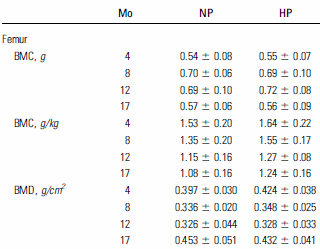|
Protein diet not bad for bones
A protein rich diet does not mean bone problems, according to an animal study from the Canadian University of Manitoba, published in the Journal of Nutrition. But a protein-rich diet doesn't strengthen the skeleton either.
Protein, diet & bones
More and more people are turning to a protein rich diet as a way to lose weight. Whereas the average western diet consists of about fifteen percent protein in terms of energy, in a typical protein diet that percentage rises to around 35 percent, replacing fats and above all carbohydrates. You are less likely to feel hungry on a protein rich diet, so you eat less. Whatís more it increases your muscle mass and raises your metabolism rate. As a result of these two factors, your body burns more calories.
Researchers are not entirely sure whether a protein-rich diet is safe in the long term. There are studies in which an increased protein consumption led to a decline in bone mass. A protein-rich diet increases the production of acid in the body, and that may reduce the amount of calcium in your bones. Every gram of protein costs you 1 milligram of calcium, according to a popular theory put about by the anti-protein lobby.
That's why the bones of vegetarians are supposed to be super strong. Many vegetarians eat less protein than normal. Supporters of high-protein diets think that vegetarians have stronger bones because they eat more whole grains, vegetables and fruit, and as a result consume more bioactive substances that strengthen their bones.
Study
The researchers' animal study was intended to provide more insight into the effect of a protein-rich diet on the skeleton. They gave female rats a diet consisting of 35 percent protein [HP] for 17 months. The extra proteins came mainly from egg protein and milk. A control group was given a diet from which 15 percent of the energy was derived from protein [NP].
Results
The HP animals had a tiny amount more lean body mass and about 50 percent less body fat after 17 months. There was no effect on the amount of minerals in their bones Ė the bone mineral content. In fact, because the HP animals had become lighter, their bones contained more minerals per kg bodyweight. The table below provides data on the femur bone in the rats. BMD = bone mineral density.

The researchers also did tests to determine the strength of the bones from the dead rats. They found out that the HP rats' bones broke slightly less easily than the bones of the NP rats. The differences were not statistically significant.

Conclusion
"The high mixed protein consumption was associated with reduced weight, fat mass, and higher LBM, but no deleterious effects to bone", the researchers conclude. This may be because they used egg and dairy protein, they think. Meat contains more amino acids, which the body converts more easily into acids, which in turn draw calcium out of the bones.
So strength athletes or low-carbers who get their extra protein mainly from shakes, eggs or dairy products don't have to worry about their bones, you might conclude from this study. But strength athletes that eat lots of meat donít need to lose sleep either: strength training enhances the formation of bone tissue.
Source:
J Nutr. 2009 Nov; 139(11): 2099-105.
More:
Ecdysterone repairs cartilage in joints 22.03.2010
Creatine makes bones stronger 15.03.2010
Two glasses of soya milk a day maintains bone mass 04.02.2010
|



